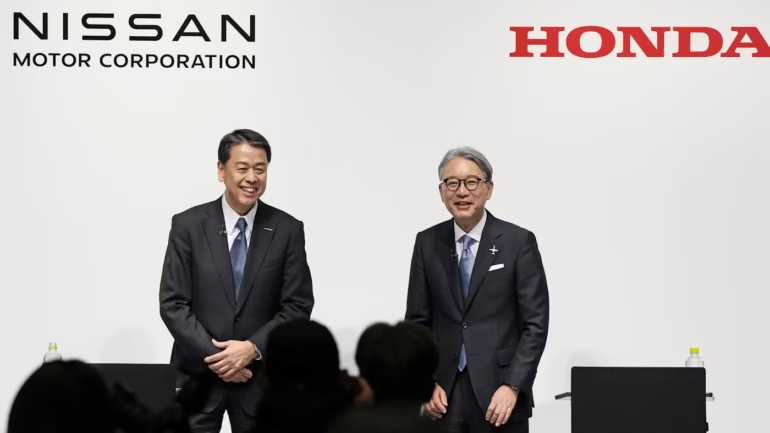TOKYO (AP) — Japanese automakers Honda and Nissan have unveiled plans to merge, aiming to create the world’s third-largest automaker by sales. The merger comes at a critical moment for the automotive industry, as it navigates a dramatic shift away from fossil fuels.
In a statement on Monday, the two companies confirmed they had signed a memorandum of understanding (MOU) and that smaller Nissan alliance member Mitsubishi Motors Corp. would also join the discussions. The integration of their operations is part of a broader strategy to accelerate electrification and cut costs in the face of fierce competition from new entrants like China’s BYD and Tesla, the EV market leader.
Honda President Toshihiro Mibe announced that the companies plan to unify their operations under a joint holding company, with Honda leading the new management. He emphasized that the principles and brands of each company would be preserved. The companies aim to reach a formal merger agreement by June and complete the deal by August 2026, with the new holding company listed on the Tokyo Stock Exchange. No financial details were provided, and Mibe acknowledged that the merger was not guaranteed, with “points that need to be studied and discussed” before finalizing.
If successful, the merger could create a combined entity worth more than $50 billion, based on current market capitalizations. Together, Honda, Nissan, and Mitsubishi would rival industry giants like Toyota and Volkswagen. Toyota, which produced 11.5 million vehicles in 2023, remains the leader in Japan, while Honda (4 million), Nissan (3.4 million), and Mitsubishi (just over 1 million) would produce a combined total of approximately 8 million vehicles annually.
The merger signals an urgent push by Japanese automakers to catch up in the electric vehicle (EV) market. Despite having pioneered hybrid technology with the Prius, Toyota’s competitors have struggled to keep pace with the rise of fully electric vehicles. The merger aims to bolster the companies’ collective resources, particularly in EVs, where they have historically lagged behind rivals like Tesla. A joint effort could also better position them to compete with global competitors such as Volkswagen, which has aggressively pursued electrification.
Industry Shift
Mibe noted that the partnership represents more than just a collaboration in specific areas. “We have come to the realization that, in order to be leaders in this mobility transformation, a more bold change is necessary,” he said. The companies had already agreed to share components for electric vehicles, such as batteries, and to jointly research software for autonomous driving.
Nissan has faced significant challenges since the 2018 arrest of its former chairman, Carlos Ghosn, on charges of financial misconduct—allegations he denies. The scandal rocked the company and led to years of management turmoil. Nissan has since struggled to recover and reduce costs.
Nissan CEO Makoto Uchida described the company’s current situation as “severe,” but expressed optimism about the merger, suggesting it could deliver substantial value for a wider customer base. In November, Nissan announced plans to cut 9,000 jobs (around 6% of its workforce) and reduce global production by 20% following a quarterly loss of ¥9.3 billion ($61 million). The company also restructured its management, with Uchida taking a 50% pay cut.
Strategic Benefits
For Honda, the merger could provide access to Nissan’s robust lineup of large, truck-based SUVs like the Armada and Infiniti QX80—vehicles Honda currently lacks in its portfolio. These models would complement Honda’s existing range and could appeal to customers seeking larger vehicles with off-road capabilities and high towing capacity. Furthermore, Nissan’s expertise in EVs and hybrid technology could accelerate Honda’s own efforts in electrification.
The merger comes amid broader industry consolidation. As automakers invest heavily in developing electric vehicles and advanced software, the pressures of scaling up production and reducing costs have led many companies to seek partnerships or mergers.
In a statement on Monday, Japanese Cabinet Secretary Yoshimasa Hayashi refrained from commenting directly on the merger but stressed the importance of maintaining competitiveness in the rapidly changing automotive market. “With the increasing importance of storage batteries and software, Japanese companies must take measures to survive international competition,” he said.
Market Reaction
The news of the potential merger sent shockwaves through the stock market. Shares of Honda surged 3.8%, while Nissan’s stock jumped 1.6%. In the days following the announcement, Nissan’s shares saw a 20% increase, reflecting investor optimism about the deal’s prospects. Despite recent financial struggles, including a downgrade of its credit outlook by Fitch Ratings, Nissan’s strong cash reserves—totaling ¥1.44 trillion ($9.4 billion)—helped to reassure investors.
Looking Ahead
As formal talks begin, both companies face a tight timeline to iron out the details of the merger. While no agreement has been reached yet, the proposed union signals a strategic shift in Japan’s automotive landscape, with companies forced to adapt quickly to the demands of an electric, software-driven future.


